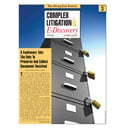Peter J Pizzi

October 30, 2017 | New York Law Journal
ISO Code of Practice for E-Discovery: A Worthy Level-Setting EndeavorIn this Outside Counsel column, Peter J. Pizzi and Julia L. Brickell write: The expertise required to conduct electronic discovery with competence and defensibility will again be in the spotlight when the International Organization for Standardization (ISO) publishes ISO 27050-3, its “Code of Practice” for electronic discovery. The draft standard is under publication and release is imminent.
By Peter J. Pizzi and Julia L. Brickell
7 minute read

May 11, 2010 | New Jersey Law Journal
Reducing the Burden of Privilege Logs in ESI ProductionsUsing categories and sampling to assert privilege rather than the traditional (and onerous) document-by-document approach, the cost of privilege logging can be reduced.
By Peter J. Pizzi
8 minute read
May 24, 2010 | The Legal Intelligencer
Reducing the ESI Burden of Privilege LogsPrivilege logs were never a fun part of business litigation. There are few tasks more tedious than logging individual pieces of correspondence by date, author, recipients, subject matter, reason withheld, etc.
By Peter J. Pizzi
8 minute read

May 20, 2010 | Law.com
Reducing the ESI Burden of Privilege LogsThe document-by-document privilege log has become one of the more costly elements of producing electronically stored information that may discourage litigation. Connell Foley attorneys Peter Pizzi and Joanna Rich posit a solution stemming from The Sedona Principles' logging by "category."
By Peter J. Pizzi
8 minute read

May 03, 2005 | New York Law Journal
Lessons From 'Uncle Henry'Peter J. Pizzi, a partner with Connell Foley, writes that if litigation ensues between a Web developer and its customer, properly prepared contract documents should enable the developer to succeed on a pretrial motion to dismiss or for summary judgment.
By Peter J. Pizzi
10 minute read
September 25, 2006 | New Jersey Law Journal
Employee Theft of E-DataIn recent years, employers victimized by disloyal employees who have misappropriated sensitive computer data have successfully sued under the civil remedy provision of the Computer Fraud and Abuse Act (CFAA), 18 U.S.C. � 1030.
By Peter J. Pizzi
11 minute read

March 14, 2006 | New York Law Journal
Patent InjunctionsPeter J. Pizzi, a partner at Connell Foley, writes that fanfare about patents essential to tens of thousands of Blackberry users may spur a dialogue about public interest factors courts are to consider in deciding whether to grant an injunction against patent infringement. Such debate is particularly timely given that the U.S. Supreme Court will soon weigh in on the subject in a patent case on its docket
By Peter J. Pizzi
12 minute read

January 05, 2006 | Law.com
Should Courts 'Let Google Be Google'?Google's Book Library Project proposes to scan into its database the entire collections of five libraries. Although groups of publishers and authors have separately sued Google claiming that its project is copyright infringement, Google asserts it's "fair use." Peter J. Pizzi says that, as with the Grokster decision, this case will involve legal principles of intellectual property law, but the outcome will likely be strongly influenced by judicial perceptions of public policy.
By Peter J. Pizzi
12 minute read

July 05, 2005 | New York Law Journal
Employer CommunicationPeter J. Pizzi, a partner with Connell Foley, writes that a federal appeals court has ruled that an e-mail sent to all employees can satisfy the "written provision" requirement of the Federal Arbitration Act and result in a legally enforceable agreement to arbitrate employment-related disputes.
By Peter J. Pizzi
10 minute read
August 04, 2010 | New Jersey Law Journal
Best Practices for Employers Choosing To Google Job ApplicantsDespite its attractions, using Internet search tools in hiring is fraught with danger for employers. While information found on the web is readily available and appears to be "public" in nature, employers risk violating various state and federal laws when considering web content in hiring.
By Peter J. Pizzi
7 minute read
Trending Stories
- 1Meta Hires Litigation Strategy Chief, Tapping King & Spalding Partner Who Was Senior DOJ Official in First Trump Term
- 2Courts Beginning to Set Standards for Evidence Relying upon Artificial Intelligence
- 3First-Degree Murder Charge May Not Fit Mangione Case
- 4Legal Tech's Predictions for Legal Ops & In-House in 2025
- 5SDNY US Attorney Damian Williams Lands at Paul Weiss
More from ALM
- Scan In Progress: Litigators Leverage AI to Screen Prospective Jurors 1 minute read
- Legal Speak at General Counsel Conference East 2024: Match Group's Katie Dugan & Herrick's Carol Goodman 1 minute read
- Legal Speak at General Counsel Conference East 2024: Eric Wall, Executive VP, Syllo 1 minute read



